Dub Camp: an independent festival for reggae sound system culture
Reggae sound system culture constitutes one of the primary areas of interest for the SST research, given its longstanding history and truly global spread. In the last two decades, Europe has slowly become one of the most active continents for reggae and dub sound systems, with a new generation of practitioners putting into practice what they have learned from the Black British veterans through pilgrimages to legendary events such as the Notting Hill Carnival or the University of Dub. This new scene is particularly strong in France, where it has met the crackling festival industry and created some of the biggest events dedicated to reggae and sound system culture. In today’s blog, SST France team member Jean Christophe Sevin takes us through last year’s edition of the Dub Camp.
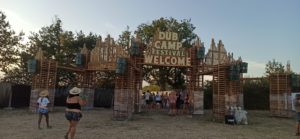
Image 1: Entrance to the festival
The first impression when you arrive on the festival site, with a large wooden structure marking the entrance, is the quality of the scenography and how welcoming the space is (Image 1). In this month of July 2022, after two years of cancellations, the security context is more and more ominous: one month has passed since the French-style policing fiasco at the Stade de France for the UEFA European Cup final [1], and one year since the planned destruction of the tekno sound systems in Redon, a few dozen kilometres from here. After two years of restrictions of freedom and testing, which have been particularly trying for the country’s youth, this warm welcome promises a sonic and social experience full of positivity… that’s contagious!
Scenography and ambiance
After the entrance, the festival site opens up onto a vast, gently sloping terrain, with a few stalls, water fountains and the Rootsman Corner in the foreground on the left, in front of which stands King Shiloh’s mythical circular sound system, the only sound diffusion point for the festival’s first evening. On the right-hand side, this entrance overlooks an area for campers and leading to the festival site itself, spatially organised around four large tents, in addition to the Rootsman Corner. Four sound attractors comprise the Sound Meeting Arena, which looks out over the whole site; the Uplift Corner is in a central position and hosts conferences and radio get-up sessions during the day, the most “intimate” of the marquees (Image 2).
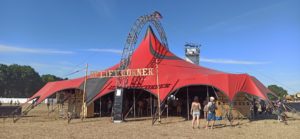
Image 2: Uplift Corner
In the lower part of the site, far enough away to avoid interference, are the Outernatianal Arena and the Dub Club Arena. This year, the latter will host a “live corner” for live performances such as that of the Dub Shepherds trio (a drummer, bassist and singer/keyboardist). This is a nod to festivals with raised stages that increasingly include a dub corner dedicated to sound systems where the unspectacular, full-frontal relationship to sound dominates. This live corner is nevertheless powered by ClearSound [2]. Léna, the festival’s communication assistant, tells me that the idea is to attract an audience more familiar with a stage format, and through this to introduce them to the sound system experience. This seems to have been a success, if the high attendance for Panda Dub’s live show on Thursday night is any indication. These five sound attractors structure our festival experience and the scenography of the site, completed by a set of wooden structures, furniture for sitting, lounging, and chatting, but also merchandising and food stalls

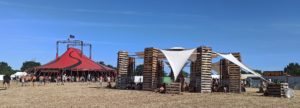
Image 3 and 4: Scenography ad chill out area
Also worth mentioning is the “Juke Box Arena,” which is a re-creation of a “Caribbean street.” This zone stands out from the festival with its more intimate atmosphere, where you can find Caribbean food and drink stalls, clothing stalls and reggae music, all of which is sounded by NoFa Sound System with a real old-fashioned jukebox available to festival-goers who can make their own selection, but which also has a dedicated programme featuring artists playing in the festival (Alpha Steppa/Roberto Sanchez/Youthie/High Elements…). Max Mo, one of the team’s painters, is also exhibiting a series of portraits of some of the great names in the history of dub (Image 5 and 6). All of this creates the atmosphere of an urban scene [3] and a sense of unity: the gathering of these amenities in this street enjoyed by festivalgoers that share the same values of openness and tolerance. Calls for alertness and tolerance are relayed in several strategic points throughout the festival (Image 7).
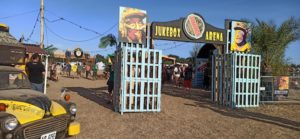
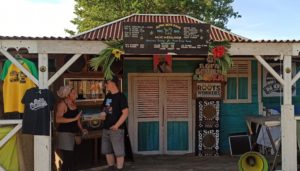
Image 5 and 6: Juke Box arena and a Caribbean street scenography
Sound system culture
Adjacent to this Juke Box Arena is an area delimited by fences containing an obstacle course for the Boxman Challenge (Image 8), held every afternoon. Open to all, the competition is for teams of two to carry heavy speaker boxes round an obstacle course – against the clock and without dropping it (at the risk of a time penalty). This evokes the material dimension of the sound system culture and reminds us in a playful and spectacular way that a sound system is above all a collection of “boxes” to transport. This is a distinctive mark of a culture that values an autonomous approach where – ideally, but not necessarily – you make your own sound system that you transport, install, and uninstall at the end of each session. This implies a set of physical constraints and an approach that can only be performed collectively (Image 9).
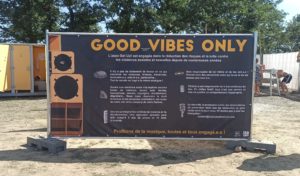
Image 7: Respectful behaviour only
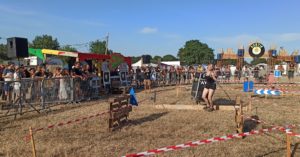
Image 8: Boxman challenge
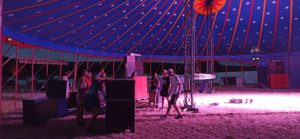
Image 9: Sound system setting up
But this is not simply a gathering of sound technology enthusiasts building sound systems. Values and meanings are embedded in these musical experiences. Again and again, we hear this refrain in the toasts of the MCs, as a means of reframing the situation, as they remind us that the music they play is not just for entertainment: we are here to dance and relax, but dance is a means to promote a spiritual approach, or music with a message. These messages are the subject of recurrent controversies, but that is simply another sign of vitality—just like the link, intrinsic or not, of the sound system and reggae with Rastafari ideology. This controversy or misunderstanding seems to have been present in the difficult collaboration on the Thursday evening during the meeting between the team of Imperial Sound Army (Feltre, Italy) and that of Dubatriation (Dijon, France). The difference was striking the next day in terms of atmosphere and camaraderie visible between the Basque Equal Brothers, the Londoners Jah Tubbys (who unfortunately could not bring their sound system set, apparently due to post-Brexit’s stringent bureaucracy) and Lion’s Den from Berlin. This recurrent controversy runs through the history of sound systems: it was visible at the UK Sound System Reasoning Day in November 2022, and it has been evident since the 1960s in Jamaica, as Thibault Ehrengardt mentioned during his Thursday 14 July lecture at the Uplift Corner on King Tubby’s sound system (Image 10).
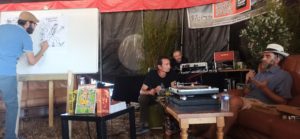
Image 10: James Danino’s lecture and Pierre Audemer drawing live
A festival like Dub Camp is an opportunity to listen not just to current productions, but also to a bunch of ‘standards’, or classics themes, that never sound the same, depending on the operator playing them and the sound system being used, since the latter functions as an instrument rather than a transparent means of sound diffusion. For example, at the Sound Meeting Arena, Imperial Sound Army plays Yabby You’s Conquering Lion in a mystical vein, and later in the evening the same track is played on the High Bass sound system, which then sounds quite different when one of the rub-a-dub accents is used. Standards – which, one might say, are by no means standardized – are like the manifestation of a tradition that is not passively transmitted but is performed in the very moment of selecting and diffusing a song. As anthropology has shown, tradition is a ‘point of view’ developed from the present on what has gone before; in this case a selection of old songs made according to present-day criteria. [4] It is the sensibility of the present moment – the way in which a piece is experienced and made to sound – that decides its relevance and its value as a tradition. And that makes tradition a “reverse filiation”: “far from fathers begetting sons, fathers are born of sons.” [5] Thus, it is in the context of the current historical conjuncture that we listen to and feel, on this Friday 15 July 2022, So Much Trouble in the World (Bob Marley) that Channel One plays at the beginning of their selection. We see other examples of tradition being established in this way at conferences dedicated to the history of reggae, where we listen to songs that are contextualised and commented on in relation to current issues. As when James Danino, through his selection of tracks tackling the themes of machismo and homophobia, echoing the round table on Saturday 16 July on the place of women in reggae music and sound systems. After Thibault Ehrengardt’s lecture on King Tubby and his sound system in Jamaica from the 1970s until his assassination in 1989, the question also arises about the inheritance of this magnificent but violent history, with these records and sound systems that fascinate and inspire us. How, in 2022, in a European society fractured by rising intolerance, can we inherit this history in order to build a world that is resilient, much like those immortal tracks that continue to make us move and shake? (Image 11)
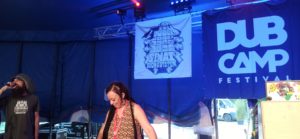
Image 11: Sista Hebesha performing
The spirit of an independent festival
The Dub Camp Festival is, as its website states, “the first European festival entirely dedicated to the outdoor sound-system movement.” After the first three editions held in the Nantes metropolis, the festival has not stopped growing, going from 9000 people for the first edition in 2014 to 35000 this year for the 7th edition – the third time the festival has been held on the site of Joué sur Erdre. Its outreach is international, with a third of the audience coming from abroad. It is organised by the Nantes-based association Get Up, founded in 2008 by Olivier Bruneau, the festival’s director. Its organisational culture is inspired by the social and solidarity economy, and the association’s headquarters are located in Solilab [6], the social and solidarity economy cluster in Nantes. “We only work with people from the social and solidarity economy network, and I am also very involved in this project,” says Olivier Bruneau.
Among other initiatives, the unclaimed sums from the cashless ticketing system are donated to local associations. At the beginning of this project, “we wanted to set up a really healthy model, because we are perceived in a stereotypical way.” Dub Camp is an independent festival, with no sponsors and no more than 5% public subsidies. “We are almost autonomous, and subsidies are just a plus, we have never included them in our budget,” he adds. This state of mind is reflected in the relationship with the locality concerning waste or energy management. Cooperation is a guiding principle, and is visible in the collective ticketing project shared with other festivals, along with the cultural resource centre, which allows the sharing of kitchen equipment, marquees, etc. Olivier Bruneau explains the idea: “we don’t pay for the storage, there is a resource centre that manages it and lends it to different projects, there are different prices, if they’re small associations, there is a specific price.” (Image 12)
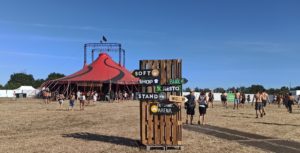
Image 12: Festival site
The strength of the festival is in its almost one thousand volunteers, who are not just a workforce assigned to secondary tasks but are an integral part of the project, says Mélanie Noyer, in charge of communication and mediation [7]. They are “members, more than volunteers, they really subscribe to the project.” Many tasks are delegated to volunteers when other festivals would use service providers. The volunteers come from all over France and abroad. Rotating shifts make it possible for all to enjoy the festival. About sixty are trained during the three days in first aid (PSC1). “We have a prevention brigade, we do a lot of work on prevention,” insists Olivier Bruneau, with the appreciable result of not having any evacuations due to alcohol or drug consumption. “I think we have created a community,” says Bruneau, because constant improvements are made based on the feedback received by the volunteers, whether it be the scenography, the water fountains or the toilets, which are now in greater supply. Consideration for all is not just an impression, but a state of mind favoured by a mode of organisation. One might think that these questions are peripheral, but in fact they are at the heart of the musical experience of the festival: if festivalgoers feel they are in a welcoming environment where they are fully respected, that will contribute to the festival atmosphere and the quality of the music. Everyone’s exchange of energy with the sound systems can only benefit.
Jean-Christophe Sevin is a lecturer in information and communication sciences (Avignon University/Centre Norbert Elias). After investigating the political and cultural reception of raves and techno music in France, he is working on the trans-local dynamics of reggae from a fieldwork in Marseille, and as a Research Agent in the SST project he investigates sound-system culture in France.
References
[1] Rémi Dupré et Nicolas Lepeltier, « Les raisons du fiasco au Stade de France : ‘fraude massive de faux billets’ou mauvaise gestion des flux ? », Le Monde, 31 mai 2022. https://www.lemonde.fr/football/article/2022/05/31/fraude-massive-de-faux-billets-ou-mauvaise-gestion-des-flux-les-raisons-du-fiasco-au-stade-de-france_6128324_1616938.html
[2] https://www.dubcampfestival.com/programmation/clearsound/
[3] Daniel Silver et Terry N. Clark. « La puissance des scènes : quantité d’aménités et qualité des lieux. », Cahiers de recherche sociologique, n°57, 2014, p. 33–60. https://doi.org/10.7202/1035274ar.
[4] Jean Pouillon. « Tradition : transmission ou reconstruction », in Fétiches sans fétichisme. Paris, Maspero, 1975, p.155-173.
[5] Gérard Lenclud, « La tradition n’est plus ce qu’elle était… Sur les notions de tradition et de société traditionnelle en ethnologie », Terrain, n°9, 1987, p.110-123. DOI : https://doi.org/10.4000/terrain.3195
[6] https://www.ecossolies.fr/-Le-Solilab-
[7] Cf. Dub Camp Backstage (Dub Camp Festival): https://www.youtube.com/watch?v=8JHgow6Utls
